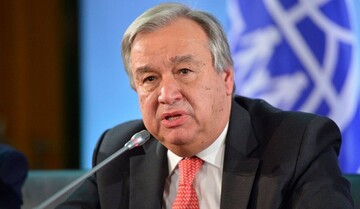Guterres presented his ninth report on the implementation of Resolution 2231 on Iran's nuclear deal at a virtual Security Council meeting held on Tuesday focusing on the issue of non-proliferation.
The report was read out by Under-Secretary-General for Political and Peacebuilding Affairs Rosemary DiCarlo during the video conference session.
The JCPOA clinched on July 14, 2015 was the outcome of 12 years of marathon talks and diplomacy. The plan was subsequently approved by Security Council Resolution 2231 (2015), which calls on all member states, regional and international organizations to support its implementation, the report said.
Since then, the international community has expressed strong support for the plan. This program proves the efficiency of multilateralism, success in preventing proliferation of nuclear weapons and is regarded as the best way to ensure the peaceful nature of the Islamic Republic's nuclear program and to provide tangible economic benefits to the Iranian people, the report said.
It further stated that it is imperative that this plan be continued for all participants.
It stressed that issues that are not directly related to the program be pursued without any prejudgment in maintaining the agreement and its achievements.
Guterres further called on all member states to avoid provocative rhetoric which may adversely affect regional stability.
Referring to the US negative actions against JCPOA, he said in the report that it reinstated all its sanctions lifted based on the deal and decided not to extend the waivers for Iran's oil and nuclear nonproliferation projects in the context of the JCPOA.
These actions, contrary to the objectives set out in the plan and Resolution 2231, may also impede the Islamic Republic of Iran's ability to implement certain provisions of the JCPOA and Resolution 2231.
He also pointed out that he will consider the concerns raised by the Islamic Republic of Iran - in the May-8 letter -, Russia - in the May-27 letter and China in the letter of June 8.
Guterres pointed to Iran's five steps to scale down commitments under the JCPOA, noting that since July 2019, Iran has taken steps to suspend its nuclear program under the auspices of the International Atomic Energy Agency.
If sanctions are lifted and Iran benefits from the UN Security Council, the country will be ready to fulfill its obligations, UN chief said, noting that Iran has emphasized that it wants to stay in the deal.
He said Iran has noted that all the measures taken since July 1, 2019 are reversible.
He called on Iran to stick to the deal and urgently consider concerns of the other participants in the JCPOA and member states of Resolution 2231.
Elsewhere in the report, Guterres hailed the achievements of the INSTEX, saying that it is important that this initiative be continued and get full support in order to keep up trade and economic relations with Iran as a matter of urgency, especially in the face of the current economic and health problems caused by the coronavirus pandemic.
He also emphasized the significant contribution of other member states in maintaining this program and urged them to work effectively with participants in this program to create the necessary conditions for trade with Iran in accordance with Resolution 2231.



Your Comment